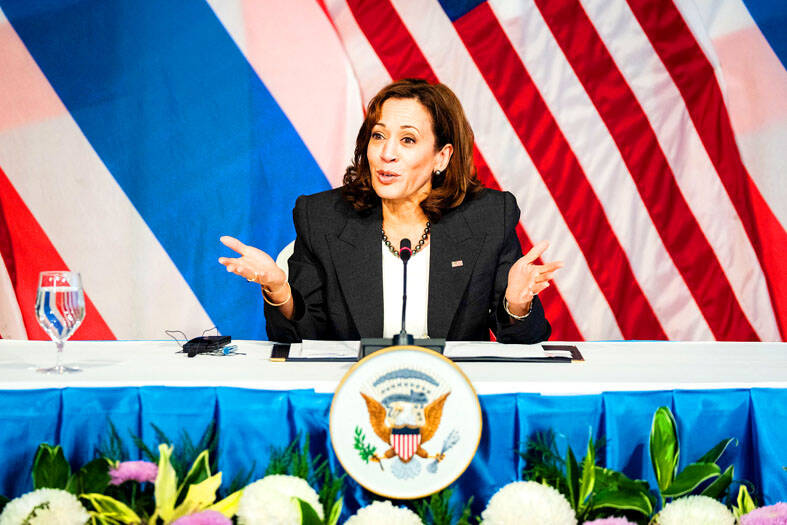US Vice President Kamala Harris yesterday arrived in the Philippines for talks aimed at reviving ties with the former US colony, an Asian ally that is central to US efforts to counter China’s increasingly assertive policies toward Taiwan.
Harris, who is to meet Philippine President Ferdinand Marcos Jr, visits the region as US President Joe Biden’s administration seeks to shore up relations with allies worried about growing Chinese influence in Southeast Asia and possible conflict over Taiwan.
The Philippines is an important part of the diplomatic push. Military access to the country, just 193km from Taiwan and adjacent to the South China Sea, would greatly complicate any attempt by China to invade Taiwan, military analysts say.

Photo: AFP
“It makes sense to invest high-level attention to restore deepened cooperation across the board with this youthful, populous, prospering, and strategically located ally,” said Daniel Russel, the top US diplomat for East Asia under former US president Barack Obama and now vice president for international security and diplomacy at the Asia Society.
Earlier, Harris said she had told Chinese President Xi Jinping (習近平), whom she met on Saturday at the APEC summit in Thailand, that Washington did not seek confrontation with China.
“We welcome competition but we do not see conflict, we do not seek confrontation,” Harris told a news conference in Bangkok before leaving for Manila.
Her visit would be the highest-level trip to the Philippines by an administration official and marks a sharp turnaround in relations.
The leaders are expected to discuss Taiwan and the South China Sea, as well as share notes on Marcos’ Thursday meeting with Xi and Biden’s with the Chinese leader on Monday last week.
“The US is not taking us for granted,” Philippine Ambassador to Washington Jose Manuel Romualdez said. “Marcos, of course, is responding to this in a manner that shows the US that we are your friends.”
In Asia, the US faces challenges in building a coalition to deter Chinese action against Taiwan. Many countries in the region are reluctant to antagonize their giant neighbor, which is not just a military power, but also a key trading partner and source of investment.
Harris would send a pointed symbolic message to China tomorrow when she meets members of the Philippines’ coast guard in a Palawan province island city at the edge of the South China Sea.
Beijing claims some territories in the waters off Palawan and much of that sea, which is believed to contain massive oil and gas deposits.
Washington is investing millions to help modernize the Philippine military, but the country has not committed to supporting any US intervention in a conflict over Taiwan.
Romualdez said in September that the Philippines would only offer assistance “if it is important for us, for our own security.”
“Any overt campaign planning against China, planning for Taiwan, is still very sensitive,” former US assistant secretary of defense Randall Schriver said. “All of that has to be navigated carefully.”

The US government has signed defense cooperation agreements with Japan and the Philippines to boost the deterrence capabilities of countries in the first island chain, a report by the National Security Bureau (NSB) showed. The main countries on the first island chain include the two nations and Taiwan. The bureau is to present the report at a meeting of the legislature’s Foreign Affairs and National Defense Committee tomorrow. The US military has deployed Typhon missile systems to Japan’s Yamaguchi Prefecture and Zambales province in the Philippines during their joint military exercises. It has also installed NMESIS anti-ship systems in Japan’s Okinawa

‘WIN-WIN’: The Philippines, and central and eastern European countries are important potential drone cooperation partners, Minister of Foreign Affairs Lin Chia-lung said Minister of Foreign Affairs Lin Chia-lung (林佳龍) in an interview published yesterday confirmed that there are joint ventures between Taiwan and Poland in the drone industry. Lin made the remark in an exclusive interview with the Chinese-language Liberty Times (the Taipei Times’ sister paper). The government-backed Taiwan Excellence Drone International Business Opportunities Alliance and the Polish Chamber of Unmanned Systems on Wednesday last week signed a memorandum of understanding in Poland to develop a “non-China” supply chain for drones and work together on key technologies. Asked if Taiwan prioritized Poland among central and eastern European countries in drone collaboration, Lin

Renewed border fighting between Thailand and Cambodia showed no signs of abating yesterday, leaving hundreds of thousands of displaced people in both countries living in strained conditions as more flooded into temporary shelters. Reporters on the Thai side of the border heard sounds of outgoing, indirect fire yesterday. About 400,000 people have been evacuated from affected areas in Thailand and about 700 schools closed while fighting was ongoing in four border provinces, said Thai Rear Admiral Surasant Kongsiri, a spokesman for the military. Cambodia evacuated more than 127,000 villagers and closed hundreds of schools, the Thai Ministry of Defense said. Thailand’s military announced that

CABINET APPROVAL: People seeking assisted reproduction must be assessed to determine whether they would be adequate parents, the planned changes say Proposed amendments to the Assisted Reproduction Act (人工生殖法) advanced yesterday by the Executive Yuan would grant married lesbian couples and single women access to legal assisted reproductive services. The proposed revisions are “based on the fundamental principle of respecting women’s reproductive autonomy,” Cabinet spokesperson Michelle Lee (李慧芝) quoted Vice Premier Cheng Li-chiun (鄭麗君), who presided over a Cabinet meeting earlier yesterday, as saying at the briefing. The draft amendment would be submitted to the legislature for review. The Ministry of Health and Welfare, which proposed the amendments, said that experts on children’s rights, gender equality, law and medicine attended cross-disciplinary meetings, adding that